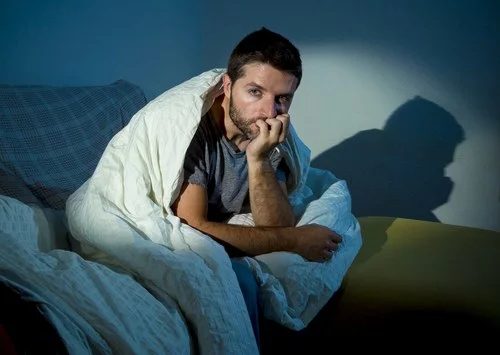Trouble sleeping is often a symptom of a deeper issue, and for some people, may be linked to a mental health disorder. Fortunately, the right kind of treatment can provide relief, and a healthier overall outcome.
Struggling to get a proper night’s sleep? You are not alone. Insomnia is a common problem experienced by adults around the world. Insomnia affects around 10-30% of the global population. While age and physical ailments can contribute to the risk of insomnia, it is also often linked to mental health conditions. In fact, sleep disturbances such as insomnia are a common symptom of a variety of mental health disorders, present in up to 50-80% of patients.
If you are having persistent issues with sleeplessness, it is important to consider whether an underlying mental health issue might be the cause. Understanding more about the link between mental health and insomnia can help you get the treatment you need to finally get a good night’s sleep.
Understanding the Connection Between Insomnia and Mental Health
A recent study examining the relationship between mental health and insomnia found that up to 80% of people with mental health disorders had trouble falling asleep, staying asleep, or waking up. The link between insomnia and mental health is bi-directional, meaning that mental health conditions can cause or contribute towards insomnia, and insomnia can exacerbate the symptoms and severity of mental health disorders. This is because lack of sleep impacts our ability to regulate our moods and emotions, and leaves us feeling depleted of both energy and motivation.
Insomnia and Depression
Insomnia and depression share a definitive link, as more than 75% of people living with depression are also affected by persistent sleep disturbances. Depression has been linked to reduced amounts of restorative, short wave deep sleep, often leaving people feeling exhausted in the morning. People experiencing insomnia are also at a higher risk for developing depression, as lack of sleep negatively impacts the brain’s ability to regulate emotions and manage stress.
Insomnia and Bipolar Disorder
Sleep troubles are a key feature of bipolar disorder, with both insomnia and hypersomnia—oversleeping—experienced by many living with this condition. The different states of mood that occur with bipolar disorder tend to affect sleep in distinct ways; while those in a manic state often experience sleeplessness and trouble falling asleep as a result of elevated energy levels, a depressive state can cause bouts of oversleeping, as well as insomnia.
Insomnia and Anxiety
Anxiety can have significant impacts on the ability to fall asleep and stay asleep. When you are constantly worried throughout the day, this creates a state of “mental hyperarousal” that persists into the sleep cycle. For some people, this means that their internal alarm system can be triggered even in the middle of the night, resulting in immediate wakefulness and racing thoughts that can keep them up for hours. The stress over not sleeping well can lead to more anxiety, deepening this unhealthy cycle.
Insomnia and Attention Deficit Hyperactivity Disorder (ADHD)
Between 25-50% of people living with ADHD report having trouble sleeping, with biological factors thought to be a significant cause. Different arousal, regulation, and alertness patterns in the brain may play a role in sleep difficulties, as well as delayed circadian rhythms and a later production of the sleep-related hormone melatonin. The lack of sleep during the night often contributes to daytime sleepiness, and can exacerbate issues with focus and attention.
Insomnia and Post-Traumatic Stress Disorder (PTSD)
Nine out of ten people living with PTSD struggle with sleep problems, including insomnia due to hyperarousal, as well as nightmares and night terrors. In fact, challenges with falling asleep or sleeping through the night can persist even after waking symptoms have been addressed. Insomnia has been linked to more severe symptoms of PTSD, as lack of sleep negatively impacts the brain’s ability to process feelings and memories after trauma.
How to Treat Mental Health-Related Insomnia
Addressing sleep difficulties caused by poor mental health starts with understanding the underlying mental health condition and what treatment options are available. Consulting with a mental health specialist can help determine an effective course of treatment, and develop a specific plan to alleviate insomnia if needed.
Cognitive behavioral therapy (CBT)
This widely used and time-tested form of talk therapy is used to help address a variety of mental health conditions. CBT focuses on helping people identify problematic thoughts and behaviours, recognising established patterns and working to alter these to more positive, healthy actions. CBT also develops good coping skills and personal confidence, and teaches people how to better understand the behaviours or actions of others. These techniques are useful in helping people understand and manage a wide range of mental health disorders, including those that contribute to insomnia.
Develop good sleep hygiene
Instituting healthy sleep habits is a critical step in overcoming insomnia, and supporting better mental health. Proper sleep hygiene covers a range of behaviours that contribute to lowered levels of stress and alertness, and a deeper sense of relaxation. These include things like:
- Setting a consistent sleep schedule where you go to bed and get up at the same times each day
- Going to sleep in a cool, dark, quiet room with no interruptions
- Shutting down screens or other electronic devices at least one hour before you go to bed
- Creating a relaxation routine to wind down physically and mentally before bed
- Limiting your caffeine intake to the morning hours, and being aware of how it affects you throughout the day
Consider a mental health retreat
If you find yourself seriously struggling with insomnia and poor mental health, you may want to look into the possibility of taking a mental health retreat. This type of intensive, residential programming offers a holistic approach to mental health disorders related to insomnia, targeting all aspects of the condition in order to best support a full recovery. Mental health retreats often include a variety of psychotherapeutic sessions as well as access to wellness practices like fitness training, meditation and massage sessions.
Embarking on a Mental Health Retreat at The Dawn

The Dawn Wellness Centre and Rehab is a resort-like inpatient treatment facility that offers unique, personalised treatment for mental health and addiction disorders. Internationally accredited by the American Accreditation Commission International (AACI) and nationally licensed by the Thai Ministry of Health, The Dawn offers comprehensive, customised programming to address all aspects of the condition, ensuring a path to healing and recovery.
Top-Notch Mental Health Treatment in Thailand
The Dawn’s internationally-trained team of mental health specialists will work closely with you to develop a personalised treatment plan upon your arrival. This plan is specially designed to help you gain a deeper understanding of your symptoms and to learn the skills needed to successfully manage your condition.
Located in beautiful Northern Thailand, our stunning grounds feature lush gardens, a swimming pool, and gorgeous architecture designed to inspire calm and reflection. You’ll find the space to relax and recover with all the comforts of home, but a world away from the triggers and stressors that exacerbate your condition.
Call The Dawn today to learn more about how we can help you achieve a higher quality of life.
Related Posts
 Top 5 Causes of Chronic Insomnia: Discover the Reasons Behind Your Restless Nights
Someone once said that insomnia has the potential to convert a person’s paradise into a place of torture. If you’ve ever struggled with sleep, you will understand what these words...
Top 5 Causes of Chronic Insomnia: Discover the Reasons Behind Your Restless Nights
Someone once said that insomnia has the potential to convert a person’s paradise into a place of torture. If you’ve ever struggled with sleep, you will understand what these words...
 How Is Insomnia Treated?
If there’s one essential pillar of mental and physical health, it’s getting enough quality sleep. Although sleep seems like doing nothing, your body is doing a lot. Sleep is when...
How Is Insomnia Treated?
If there’s one essential pillar of mental and physical health, it’s getting enough quality sleep. Although sleep seems like doing nothing, your body is doing a lot. Sleep is when...
 Coping with COVID-19 on Top of Your Mental Health Condition
As you enter a new day of social distancing, you may be wondering how to cope with COVID-19 – especially if you are also managing a mental health condition. Fortunately,...
Coping with COVID-19 on Top of Your Mental Health Condition
As you enter a new day of social distancing, you may be wondering how to cope with COVID-19 – especially if you are also managing a mental health condition. Fortunately,...
 Agoraphobia: The Mental Health Condition Prince Harry Struggles With
For those struggling with agoraphobia like Prince Harry, fear of being in public spaces can make people prisoners in their own homes. However, like many mental health disorders, agoraphobia is...
Agoraphobia: The Mental Health Condition Prince Harry Struggles With
For those struggling with agoraphobia like Prince Harry, fear of being in public spaces can make people prisoners in their own homes. However, like many mental health disorders, agoraphobia is...





